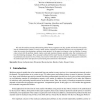Free Online Productivity Tools
i2Speak
i2Symbol
i2OCR
iTex2Img
iWeb2Print
iWeb2Shot
i2Type
iPdf2Split
iPdf2Merge
i2Bopomofo
i2Arabic
i2Style
i2Image
i2PDF
iLatex2Rtf
Sci2ools
119
click to vote
IJISEC
2008
2008
A coding approach to the multicast stream authentication problem
We study the multicast stream authentication problem when an opponent can drop, reorder and introduce data packets into the communication channel. In such a model, packet overhead and computing efficiency are two parameters to be taken into account when designing a multicast stream protocol. In this paper, we propose to use two families of erasure codes to deal with this problem, namely, rateless codes and maximum distance separable codes. Our constructions will have the following advantages. First, our packet overhead will be small. Second, the number of signature verifications to be performed at the receiver is O(1). Third, every receiver will be able to recover all the original data packets emitted by the sender despite losses and injection occurred during the transmission of information.
Related Content
| Added | 12 Dec 2010 |
| Updated | 12 Dec 2010 |
| Type | Journal |
| Year | 2008 |
| Where | IJISEC |
| Authors | Christophe Tartary, Huaxiong Wang, Josef Pieprzyk |
Comments (0)

